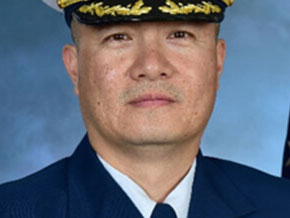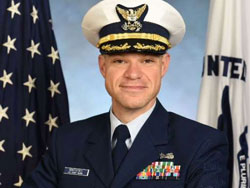US Coast Guard Cites Cyber Security Exposures At U.S. Ports
The U.S. Coast Guard is warning that U.S. ports and marine terminals remain exposed to cyber attacks on a number of different fronts.
In a presentation to the Propeller Club of Northern California, Commander Boris Montatsky, who serves at the U.S. Coast Guard Cyber Command as the Cyber Effects and Protection Division Chief, said there are six areas of risks at ports, marine terminals and on vessels:
Facility Access: A compromise “impacting physical access control systems can lead to supply chain delays and localized traffic congestion in the vicinity of a port.”
Terminal Headquarters/Data: Terminal & Gate Operating Systems (TOS/GOS) streamline the flow of cargo in a port. A compromise “to a port’s TOS/GOS data could result in leaks of sensitive supply chain data from port customers. Manipulation of TOS/GOS data could also be used for smuggling or cargo theft.”
Terminal Headquarters Ransomware: A ransomware attack affecting TOS/GOS systems “could make critical systems and data inaccessible. This could lead to a full stop of port operations, resulting in financial losses and supply chain disruptions. “
Operational Technology (OT) Systems: Maritime infrastructure relies on various OT systems to control pumps, cranes, and other industrial equipment: “The compromise of an OT system can cause safety issues and lead to loss of life or property. In addition, a compromise can disrupt facility operations. “
Positioning, Navigation, & Timing (PNT): PNT often supports many vessels within a port’s vicinity and is critical to maritime operations: “Loss of PNT can impede vessels’ ability to safely navigate a port, and lead to an increased risk of collisions and groundings. Any of these events can result in environmental damage, loss of life, property, or a disruption to safe navigation.”
Vessel: A compromise to shipboard systems “could impact a vessel’s ability to safely navigate and manage their cargo. A vessel compromise could also lead to disruption of shore-side systems, because lateral movement is possible through shared wireless or wired networks, portable media and other interconnections.”
Challengers Fighting Cyber Attacks
Captain Taylor Lam, Commander Sector San Francisco, provided an overview of issues facing the Coast Guard and the U.S. maritime industry: “We’re probably not where we need to be yet, but we have certainly made significant advances and strides in where we need to go…”

The Coast Guard wants industry to become more invested in cyber security: “We’re looking for basic cyber hygiene and seeing whether those elements are addressed. We are encouraging industry to reach out to organizations such as the National Institute of Standards and Technology (NIST) or the like to develop those facility security plans… Our marine inspectors from a vessel security plan standpoint, are assessing to what degree basic cyber hygiene is being adhered to on those vessels that have a safety management plan in place and should be addressing those basic elements.”
Job Opportunities
In terms of workforce training, Lam said: “What we are trying to do is to train our workforce and enhance our cyberliteracy to be better educated formally in what to look for. We are in the process of hiring marine transportation system cyber security specialists at each of the thirty-seven (Coast Guard) sector commands across the nation. Here at Sector San Francisco, we are hiring people who are the translators, so to speak, between our vessel inspectors, facility inspectors, security inspectors and what that means from a cyber security standpoint. “
Commander Montatsky and Captain Lam said that there will more hiring of people to support cyber security work. Montatsky said the key element the Coast Guard is looking for is “90% motivated and 10% qualified.”
Brandon Jose, who recently started working as a system administrator at the Naval Information Warfare Center Pacific in San Diego, California said he related to Montatsky’s characterization of being 90% motivated: “I got into cybersecurity because I am very passionate about what I do.”

© Copyright 1999–2024 American Journal of Transportation. All Rights Reserved


